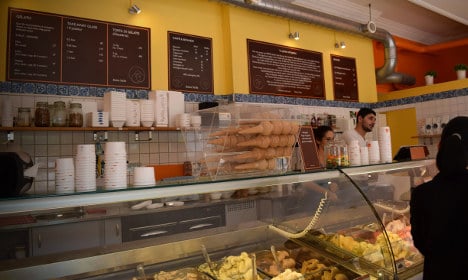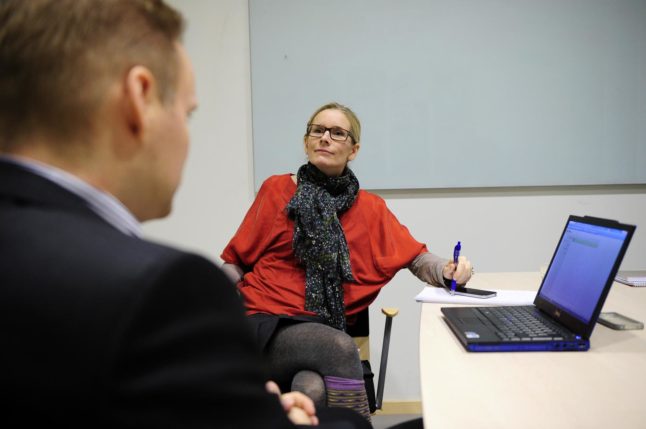It’s surprising how much of your homeland you can find elsewhere, but it’s incredible that a tiny piece of Sicily can be found right here in Malmö, Sweden. Dolce Sicilia near the city’s central train station combines the best of Sicily – a fairy-tale love story and handmade ice cream – with a real love for the country it’s located in.
After speaking with Maugeri (or “Mamma Dolce Sicilia” as she likes to call herself), I feel like Dolce Sicilia’s story may as well start with “Once upon a time…”. Like a true Sicilian, she doesn’t hold back on the hospitality, and happily talks at length on every question I ask her.
The ice cream parlour’s story began in 2006, when Maugeri decided to leave her native Sicily for a new chapter in Sweden in the hope of reinventing her life after a divorce that didn’t sit well in a disapproving conservative society.
“We need to be brave,” she said, and that bravery drove her north to Sweden, where one of her four children was already living.
Her inspiration was a desire “do something that can give joy and happiness to people” she explained, as was a life-long engagement with her grandparents’ passion. They were the owners of “Costarelli di Maugeri”, a famous, much-loved ice cream parlour in Acireale, Sicily.
It was during her days there that she started to pick up the family’s creativity, and an urge to continue their tradition through the same quest to make genuine, quality handmade ice cream.
Dolce Sicilia. Photo: Silvia La Rosa
Her grandparents’ success was founded on the quality and authenticity of their products, the opposite of typical processed ice cream. With Dolce Sicilia, Maugeri also had the specific aim to be the first organic, handmade ice cream parlour in Skåne. That wish has became a reality, with the family’s recipes proudly taken all the way from Italy to Sweden.
It has been such a success so quickly that Maugeri describes being astonished during the early days. She barely had time to think “Will anyone come?” before the ice cream was selling out and queues were forming out the door, she explained.
Mamma Maugeri told me that she was determined to have the best products and a level of excellence on par with Italian ice cream parlours. It is for that reason that the nuts used in the ice cream come from Sicily: the pistachios are from Bronte, the almonds from Avola, and the hazelnuts from Nebrodi. That choice has been made to ensure a high standard. Moreover, as Maugeri proudly confessed, it was a choice she made in her heart in order to maintain a strong bond with her motherland and support its produce.

“Home-made additive-free ice-cream, made with authentic quality ingredients according to old Siclian recipes”. Photo: Silvia La Rosa
Producing ice cream in a cold country like Sweden may seem like a bizarre choice to an outsider, but Maugeri explains that her business idea did not happen without reason, and it was planned at length. There were initial worries, but she was certain that she was right to be brave and give herself a chance, and the results soon started to show.
And Dolce Sicilia has been successful in more ways than one. One day, a local journalist decided to write an article on the ice cream parlour, and that piece in turn inspired his editor to go and try the product out in person. What he didn’t know was that he was going to meet his future wife.
“I went for an ice cream, but I ended up finding my wife, I was so lucky!” he tells me proudly. The passionate expression on his face and his perfect Italian, despite Swedish origins, says it all.
As it happens, Maugeri’s now husband was already madly in love with Italy, its food, its wine, and above all, Sicilian composer Vincenzo Bellini. In a way, he was already connected to his future wife’s home city of Catania, where Bellini also hailed from.
A lot has happened since the beginnings of Dolce Sicilia back in 2006, and I asked Maugeri what her biggest triumph has been. She didn’t hesitate: “the greatest success is my husband, of course”.
Maugeri and her husband, Göran Holmström. Photo: Francesca Maugeri
It is interesting to hear a Sicilian’s perception of Sweden, a country which is different to Sweden in so many ways. I asked Maugeri what qualities she would export from her adopted home to her homeland, and above all she praised Swedes’ respect for nature, their capacity to relate to and live in the environment, and how they enjoy what they have with respect and care.
“In Italy we make so much of an effort to make our houses sparkle because they are ours, but we don’t have the same care for the outside world. In Sweden it’s different,” she told me.
Italians could learn some respect and love for the world beyond the inside of their home, she thinks.
As for Sicily, when I ask Maugeri what she misses about her birthplace, there is a clear melancholy in her eyes. It is the look of someone who can never forget their first home, and as a result feels the pains of their motherland even stronger than some people still living there. “My life is proof that you have to be brave,” she concluded.

Dolce Sicilia's very own Piazza in Malmö. Photo: Silvia La Rosa
It feels like Dolce Sicilia has been about much more than perfect ice cream, but rather, about returning to Sicily without having to leave Sweden. Returning through the flavours, colours, and traditional scenes from the tiny Sicilian streets. Even the plaster in the ice cream bar has a warm ochre colour, with the scent of lemon thick in the air.
Importantly, it also has real Sicilian enthusiasm, the genuine warmth of people who love nothing more than an espresso and a chat, and the simple pleasure of sharing their love of their homeland.
This article was written by Italian blogger Silvia La Rosa. You can find her blog here.



 Please whitelist us to continue reading.
Please whitelist us to continue reading.